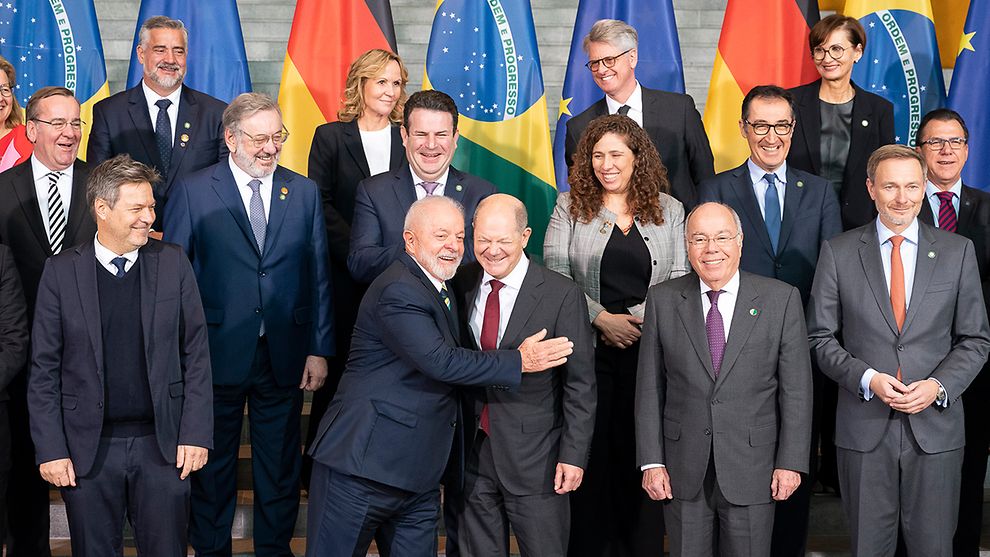Photo: Federal Government/Kugler
Despite a distance of approximately 9,000 kilometres as the crow flies, Germany and Brazil have enjoyed a strategic partnership for 15 years. Their aim is to work together towards greater sustainability. "In order to achieve even more together in the future, we have just signed the 'Partnership for Socially Just and Ecological Transformation'," said Federal Chancellor Olaf Scholz at the conclusion of the 2nd German-Brazilian Intergovernmental Consultation in Berlin.
Joint projects for greater sustainability
Germany and Brazil want to cooperate on climate protection, decarbonisation of industry, forest protection and biodiversity. "Germany supports Brazil in its goal of 'zero deforestation by 2030' to protect the Amazon rainforest," said Chancellor Scholz. "We are united by climate protection that benefits everyone." Germany will help build a climate-neutral industry in Brazil and invest in climate research.
Scholz says it is important that this change will only be successful if it is socially just. Germany would therefore help create prosperity and jobs in Brazil. "Under the umbrella of our new transformation partnership, the responsible ministers signed a good ten declarations of intent today to bring the partnership to life," said the Federal Chancellor.
Deeper cooperation is planned, for example in the field of green hydrogen. "Here we are combining Brazil's potential with Germany's interest in green hydrogen to create a joint project that will benefit everyone, including economically," the Chancellor stressed. Germany also wants to strengthen the development of local value chains in Brazil through environmentally friendly extraction and processing of raw materials.
A view of conflicts in the world
The range of topics covered in the government consultation was broad. Bilateral issues, economic and financial policy issues, and environmental transformation were discussed in the joint plenary meeting, as well as in bilateral talks between Heads of Government and in exchanges between relevant Ministers. Other topics included energy, climate, environment, development and food.
In view of the wars in Ukraine and the Middle East, foreign and defence policy was also on the agenda. Mr Scholz made it clear that Russia's war against Ukraine violates the principles of the UN Charter and international law. Brazil, as a member of the BRICS, has an important mediating role to play in this war.
Nand despite their different views on Hamas' terror against Israel, the two heads of government agreed that "we want a political solution to the Middle East conflict". Although it is difficult to imagine at present, Scholz and Lula were convinced of the goal of both states that Israelis and Palestinians should be able to live together in peace.
Support for the conclusion of an agreement between the EU and Mercosur
German Chancellor Scholz and Brazilian President Lula then attend a joint economic conference at the House of German Economy. The German government is working with its Brazilian partners on an ambitious free trade policy and the swift conclusion of the EU-Mercosur agreement.
"In order to exploit the enormous potential that lies in trade and economic relations, Brazil and Germany support the conclusion of the EU-Mercosur agreement," the Chancellor said. "We are firmly committed to ensuring that the agreement is now fast-tracked to completion. On the European side, the European Commission is leading the negotiations. We are in dialogue with President Lula on this."
Joint agreements such as the Mercosur Agreement bring economic benefits to both sides, creating and securing jobs and investment. They also promote social and environmental standards. The German Government ensures that free trade is organised in a fair, social and environmental manner. This guarantees prosperity and sustainable economic growth.
https://www.bundeskanzler.de/bk-de/aktuelles/regierungskonsultationen-deutschland-brasilien-2246888
bundeskanzler.de/JaV



